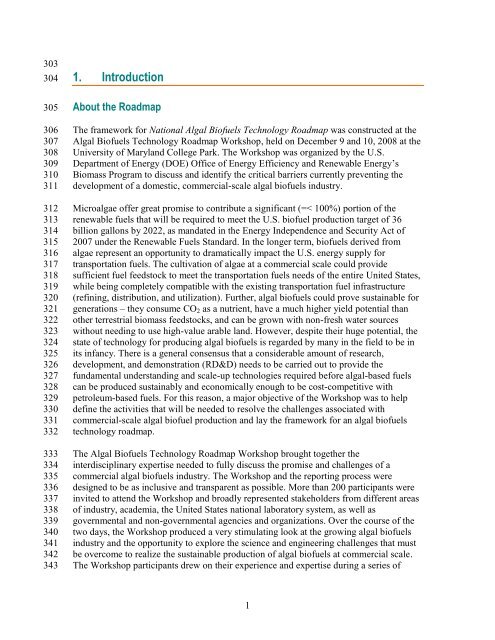Download the Algal Biofuels Roadmap draft document - Sandia
Download the Algal Biofuels Roadmap draft document - Sandia
Download the Algal Biofuels Roadmap draft document - Sandia
You also want an ePaper? Increase the reach of your titles
YUMPU automatically turns print PDFs into web optimized ePapers that Google loves.
303<br />
304<br />
305<br />
306<br />
307<br />
308<br />
309<br />
310<br />
311<br />
312<br />
313<br />
314<br />
315<br />
316<br />
317<br />
318<br />
319<br />
320<br />
321<br />
322<br />
323<br />
324<br />
325<br />
326<br />
327<br />
328<br />
329<br />
330<br />
331<br />
332<br />
333<br />
334<br />
335<br />
336<br />
337<br />
338<br />
339<br />
340<br />
341<br />
342<br />
343<br />
1. Introduction<br />
About <strong>the</strong> <strong>Roadmap</strong><br />
The framework for National <strong>Algal</strong> <strong>Biofuels</strong> Technology <strong>Roadmap</strong> was constructed at <strong>the</strong><br />
<strong>Algal</strong> <strong>Biofuels</strong> Technology <strong>Roadmap</strong> Workshop, held on December 9 and 10, 2008 at <strong>the</strong><br />
University of Maryland College Park. The Workshop was organized by <strong>the</strong> U.S.<br />
Department of Energy (DOE) Office of Energy Efficiency and Renewable Energy‘s<br />
Biomass Program to discuss and identify <strong>the</strong> critical barriers currently preventing <strong>the</strong><br />
development of a domestic, commercial-scale algal biofuels industry.<br />
Microalgae offer great promise to contribute a significant (=< 100%) portion of <strong>the</strong><br />
renewable fuels that will be required to meet <strong>the</strong> U.S. biofuel production target of 36<br />
billion gallons by 2022, as mandated in <strong>the</strong> Energy Independence and Security Act of<br />
2007 under <strong>the</strong> Renewable Fuels Standard. In <strong>the</strong> longer term, biofuels derived from<br />
algae represent an opportunity to dramatically impact <strong>the</strong> U.S. energy supply for<br />
transportation fuels. The cultivation of algae at a commercial scale could provide<br />
sufficient fuel feedstock to meet <strong>the</strong> transportation fuels needs of <strong>the</strong> entire United States,<br />
while being completely compatible with <strong>the</strong> existing transportation fuel infrastructure<br />
(refining, distribution, and utilization). Fur<strong>the</strong>r, algal biofuels could prove sustainable for<br />
generations – <strong>the</strong>y consume CO2 as a nutrient, have a much higher yield potential than<br />
o<strong>the</strong>r terrestrial biomass feedstocks, and can be grown with non-fresh water sources<br />
without needing to use high-value arable land. However, despite <strong>the</strong>ir huge potential, <strong>the</strong><br />
state of technology for producing algal biofuels is regarded by many in <strong>the</strong> field to be in<br />
its infancy. There is a general consensus that a considerable amount of research,<br />
development, and demonstration (RD&D) needs to be carried out to provide <strong>the</strong><br />
fundamental understanding and scale-up technologies required before algal-based fuels<br />
can be produced sustainably and economically enough to be cost-competitive with<br />
petroleum-based fuels. For this reason, a major objective of <strong>the</strong> Workshop was to help<br />
define <strong>the</strong> activities that will be needed to resolve <strong>the</strong> challenges associated with<br />
commercial-scale algal biofuel production and lay <strong>the</strong> framework for an algal biofuels<br />
technology roadmap.<br />
The <strong>Algal</strong> <strong>Biofuels</strong> Technology <strong>Roadmap</strong> Workshop brought toge<strong>the</strong>r <strong>the</strong><br />
interdisciplinary expertise needed to fully discuss <strong>the</strong> promise and challenges of a<br />
commercial algal biofuels industry. The Workshop and <strong>the</strong> reporting process were<br />
designed to be as inclusive and transparent as possible. More than 200 participants were<br />
invited to attend <strong>the</strong> Workshop and broadly represented stakeholders from different areas<br />
of industry, academia, <strong>the</strong> United States national laboratory system, as well as<br />
governmental and non-governmental agencies and organizations. Over <strong>the</strong> course of <strong>the</strong><br />
two days, <strong>the</strong> Workshop produced a very stimulating look at <strong>the</strong> growing algal biofuels<br />
industry and <strong>the</strong> opportunity to explore <strong>the</strong> science and engineering challenges that must<br />
be overcome to realize <strong>the</strong> sustainable production of algal biofuels at commercial scale.<br />
The Workshop participants drew on <strong>the</strong>ir experience and expertise during a series of<br />
1


